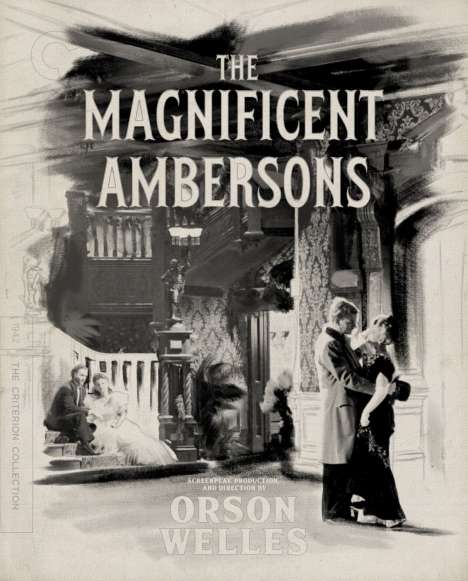The Magnificent Ambersons (1942) (Blu-ray) (UK Import)
The Magnificent Ambersons (1942) (Blu-ray) (UK Import)
Die Blu-Ray wurde als High-Definition-Nachfolger der DVD entwickelt und bietet ihrem Vorläufer gegenüber eine erheblich gesteigerte Datenrate und Speicherkapazität. Auf Blu-Rays können daher Filme mit deutlich besserer Auflösung gespeichert werden und bieten auf entsprechenden Bildschirmen eine enorm hohe Bildqualität. Blu-Ray-Player sind in der Regel abwärtskompatibel zu DVDs, so dass auch diese abgespielt werden können.
Lassen Sie sich über unseren eCourier benachrichtigen, falls das Produkt bestellt werden kann.
- Herkunftsland:
- USA, 1942
- Altersfreigabe:
- Dieser Titel ist nicht FSK-geprüft.
Eine Lieferung an Minderjährige ist nicht möglich.
Infos zu Titeln ohne Jugendfreigabe - UPC/EAN:
- 5050629239935
- Erscheinungstermin:
- 28.1.2019
- Serie:
- Criterion Collection
- Genre:
- Drama
- Spieldauer ca.:
- 88 Min.
- Regie:
- Orson Welles
- Darsteller:
- Tim Holt, Joseph Cotten, Dolores Costello, Anne Baxter
- Autor:
- Booth Tarkington
- Filmmusik:
- Bernard Herrmann
- Deutscher Titel:
- Der Glanz des Hauses Amberson (1942)
- Sprache:
- Englisch
- Bild:
- 4:3
- Untertitel:
- Englisch
Ähnliche Artikel
Orson Welles’s beautiful, nostalgia-suffused second feature—the subject of one of cinema’s greatest missing-footage tragedies—harks back to turn-of-the-twentieth-century Indianapolis, chronicling the inexorable decline of the fortunes of an affluent family. Adapted from an acclaimed Booth Tarkington novel and featuring restlessly inventive camera work and powerful performances from a cast including Joseph Cotten, Tim Holt, and Agnes Moorehead, the film traces the rifts deepening within the Amberson clan—at the same time as the forces of progress begin to transform the city they once ruled. Though RKO excised over forty minutes of footage, now lost to history, and added an incongruously upbeat ending, The Magnificent Ambersons is an emotionally rich family saga and a masterful elegy for a bygone chapter of American life.
Extras
New 4K digital restoration, with uncompressed monaural soundtrack on the Blu-ray
Two audio commentaries, featuring scholars Robert L. Carringer and James Naremore and critic Jonathan Rosenbaum
New interviews with film historians Simon Callow and Joseph McBride
New video essay on the film’s cinematographers by scholar François Thomas
New video essays by scholars François Thomas and Christopher Husted
Director Orson Welles on The Dick Cavett Show in 1970
Segment from a 1925 silent adaptation of The Magnificent Ambersons
Audio from a 1978 AFI symposium on Welles, and audio interviews with Welles conducted by filmmaker Peter Bogdanovich
Two Mercury Theatre radio plays: Seventeen (1938), an adaptation of another Booth Tarkington novel by Welles, and The Magnificent Ambersons (1939)
Trailer
PLUS: An essay by critic Molly Haskell and (Blu-ray only) essays by authors and critics Luc Sante, Geoffrey O’Brien, Farran Smith Nehme, and Jonathan Lethem, and excerpts from an unfinished 1982 memoir by Welles









